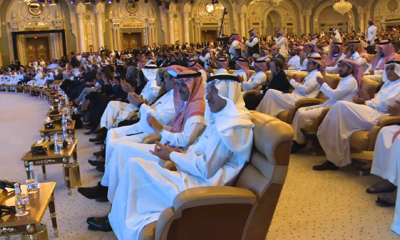- Not Everyone’s Happy About the Saudi Decision to Let Women Drive
Millions of smartphones across Saudi Arabia pinged non-stop with words of disbelief and congratulations after the surprise announcement that the kingdom will remove the ban on women driving.
“It’s amazing,” said 20-year-old Reyouf Almuhaya, a college student, speaking by phone from Riyadh. “I might have cried a little. It feels good. It feels free. Freedom is all I can think about right now.”
Like many women, Almuhaya was sitting in the back of a car — a hired male driver behind the wheel — when she heard the news. She tried to tell the driver, and he wasn’t pleased about the change, she said.
“He was like, when am I going to leave then?” she said.
In many ways, the streets of Riyadh seemed unchanged Tuesday night. Men lounged in male-only cafes on the capital’s main boulevard, smoking and sipping coffee. Male drivers revved their engines as they crawled up and down the street, showing off — as they do most evenings. Bored young men strolled aimlessly, looking for something to do.
But the topic of almost every conversation was the same, as if the whole city had coalesced in one sitting room for a heated debate.
“Congratulations on driving!” one young man called out to a female Bloomberg reporter, while another group of men jokingly asked why she wasn’t driving. None of them would give their names, wary of criticizing the government’s decision, but all of them said that allowing women to drive was a mistake.
‘Culturally Cloistered’
Saudi women aren’t ready to drive because they’re culturally cloistered, said one of the men, a 28-year-old from Riyadh. He said it would cause females to “disobey” their families. His 24-year-old friend said the decision shouldn’t have been announced abruptly.
Just last week, the government suspended a regional religious official after videos of him mocking the idea of women driving went viral. He suggested that women had loose morals and limited brain capacity in general — “a quarter of a brain” under certain circumstances — and were thus unfit to drive.
After the royal order came out, a top trending hashtag on Twitter in Saudi Arabia Tuesday night declared: “The women of my house won’t drive.”
“It’s a bit bold, this decision, you know?” said 27-year-old Mona Ibrahim, walking with a female friend. “We don’t know how we’ll start, first, and what are the conditions? And also what worries me is the age permitted. Maybe they’ll say we’ll start from 40.”
‘Journey’ Continues
Women will be entitled to driving licenses starting in June next year, the official Saudi Press Agency reported. Committees from various ministries have been set up to examine implementation, and they’ll report within 30 days, the SPA said.
Manal Al Sharif, an activist who led the 2011 Women2Drive movement, said on Twitter that “Today is a rehabilitation to women from 1990 till the moment women can drive. We continue our journey to demand an end to male guardianship.”
Al Sharif was previously detained for driving inside in the kingdom and was released only after signing a form pledging not to participate in any future campaigns and not to drive again.
Historically, women who protested the ban were stigmatized in society. In Riyadh in 1990, a group of women who drove in protest were detained, named and shamed. Many lost jobs and were stigmatized for years.
Aziza Alyousef, a long-time women’s-rights activist, thanked the king and “every woman from the 1990s until now who participated in campaigns and continue to ask for their rights.” While Alyousef didn’t participate in the 1990s, she was an active supporter and participated in later campaigns in 2011 and 2013.
“Everybody is so excited,” she said by phone from Mecca. “My phone is not stopping. Everybody is excited and happy, and I think it’s a really big move.”
She’ll apply for a Saudi license as soon as she can, she said.
“I want to be No. 1,” she said. “I wish my license number will be 0001.”


 Forex4 weeks ago
Forex4 weeks ago
 Naira4 weeks ago
Naira4 weeks ago
 Billionaire Watch3 weeks ago
Billionaire Watch3 weeks ago



 Naira4 weeks ago
Naira4 weeks ago






 Naira3 weeks ago
Naira3 weeks ago


 Naira2 weeks ago
Naira2 weeks ago






 Naira2 weeks ago
Naira2 weeks ago


 Naira3 weeks ago
Naira3 weeks ago























